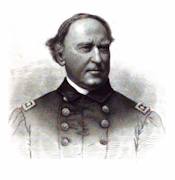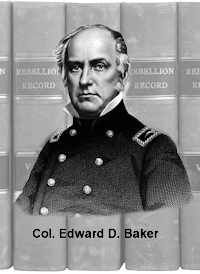The illness which had prostrated some of the strongest men in Washington, including General McClellan himself, developed itself as soon as I ceased to be sustained by the excitement, such as it was, of daily events at the capital, and by expectations of a move; and for some time an attack of typhoid fever confined me to my room, and left me so weak that I was advised not to return to Washington till I had tried change of air. I remained in New York till the end of January, when I proceeded to make a tour in Canada, as it was quite impossible for any operation to take place on the Potomac, where deep mud, alternating with snow and frost, bound the contending armies in winter quarters. On my return to New York, at the end of February, the North was cheered by some signal successes achieved in the West principally by gunboats, operating on the lines of the great rivers. The greatest results have been obtained in the capture of Fort Donaldson and Fort Henry, by Commodore Foote’s flotilla co-operating with the land forces. The possession of an absolute naval supremacy, of course, gives the North United States powerful means of annoyance and inflicting injury and destruction on the enemy; it also secures for them the means of seizing upon bases of operations wherever they please, of breaking up the enemy’s lines, and maintaining communications; but the example of Great Britain in the revolutionary war should prove to the United States that such advantages do not, by any means, enable a belligerent to subjugate a determined people resolved on resistance to the last. The long-threatened encounter between Bragg and Browne has taken place at Pensacola, without effect, and the attempts of the Federals to advance from Port Royal have been successfully resisted. Sporadic skirmishes have sprung up over every border State; but, on the whole, success has inclined to the Federals in Kentucky and Tennessee.
On the 1st March, I arrived in Washington once more, and found things very much as I had left them: the army recovering the effect of the winter’s sickness and losses, animated by the victories of their comrades in Western fields, and by the hope that the ever-coming to-morrow would see them in the field at last. In place of Mr. Cameron, an Ohio lawyer named Stanton has been appointed Secretary of War. He came to Washington, a few years ago, to conduct some legal proceedings for Mr. Daniel Sickles, and by his energy, activity, and a rapid conversion from democratic to republican principles, as well as by his Union sentiments, recommended himself to the President and his Cabinet.
The month of March passed over without any remarkable event in the field. When the army started at last to attack the enemy—a movement which was precipitated by hearing that they were moving away— they went out only to find the Confederates had fallen back by interior lines towards Richmond, and General McClellan was obliged to transport his army from Alexandria to the peninsula of York Town, where his reverses, his sufferings, and his disastrous retreat, are so well known and so recent, that I need only mention them as among the most remarkable events which have yet occurred in this war.
I had looked forward for many weary months to participating in the movement and describing its results. Immediately on my arrival in Washington, I was introduced to Mr. Stanton by Mr. Ashman, formerly member of Congress and Secretary to Mr. Daniel Webster, and the Secretary, without making any positive pledge, used words, in Mr. Ashman’s presence, which led me to believe he would give rne permission to draw rations, and undoubtedly promised to afford me every facility in his power. Subsequently he sent me a private pass to the War Department to enable me to get through the crowd of contractors and jobbers; but on going there to keep my appointment, the Assistant-Secretary of War told me Mr. Stanton had been summoned to a Cabinet Council by the President.
We had some conversation respecting the subject matter of my application, which the Assistant-Secretary seemed to think would be attended with many difficulties, in consequence of the number of correspondents to the American papers who might demand the same privileges, and he intimated to me that Mr. Stanton was little disposed to encourage them in any way whatever. Now this is undoubtedly honest on Mr. Stanton’s part, for he knows he might render himself popular by granting what they ask; but he is excessively vain, and aspires to be considered a rude, rough, vigorous Oliver Cromwell sort of man, mistaking some of the disagreeable attributes and the accidents of the external husk of the Great Protector for the brain and head of a statesman and a soldier.
The American officers with whom I was intimate gave me to understand that I could accompany them, in case I received permission from the Government; but they were obviously unwilling to encounter the abuse and calumny which would be heaped upon their heads by American papers, unless they could show the authorities did not disapprove of my presence in their camp. Several invitations sent to me were accompanied by the phrase, “You will of course get a written permission from the War Department, and then there will be no difficulty.'” On the evening of the private theatricals by which Lord Lyons enlivened the ineffable dullness of Washington, I saw Mr. Stanton at the Legation, and he conversed with me for some time. I mentioned the difficulty connected with passes. He asked me what I wanted. I said, “An order to go with the army to Manassas.” At his request I procured a sheet of paper, and he wrote me a pass, took a copy of it, which he put in his pocket, and then handed the other to me. On looking at it, I perceived that it was a permission for me to go to Manassas and back, and that all officers, soldiers, and others, in the United States service, were to give me every assistance and show me every courtesy; but the hasty return of the army to Alexandria rendered it useless.
The Merrimac and Monitor encounter produced the profoundest impression in Washington, and unusual strictness was observed respecting passes to Fortress Monroe.
 None of our vessels have yet arrived. I sent over to Biloxi yesterday, and robbed the post-office of a few papers. They speak volumes of discontent. It is no use—the cord is pulling tighter, and I hope I shall be able to tie it. God alone decides the contest; but we must put our shoulders to the wheel.
None of our vessels have yet arrived. I sent over to Biloxi yesterday, and robbed the post-office of a few papers. They speak volumes of discontent. It is no use—the cord is pulling tighter, and I hope I shall be able to tie it. God alone decides the contest; but we must put our shoulders to the wheel.


 March 18 — Everything was quiet in front until the middle of the afternoon. Then a report reached camp that the Yanks were advancing. We were ordered to pack up as quickly as possible and get ready for action. The enemy advanced rapidly, and we were ordered to Cedar Creek to oppose their onward march. We put our guns in position about half a mile from the creek on the west side of the pike, on a hill which commanded the bridge and its approaches.
March 18 — Everything was quiet in front until the middle of the afternoon. Then a report reached camp that the Yanks were advancing. We were ordered to pack up as quickly as possible and get ready for action. The enemy advanced rapidly, and we were ordered to Cedar Creek to oppose their onward march. We put our guns in position about half a mile from the creek on the west side of the pike, on a hill which commanded the bridge and its approaches.





